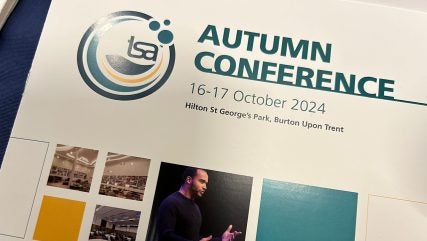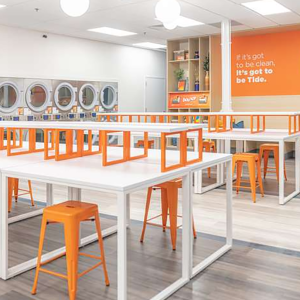
UK
Textile Services Association (TSA) chair, Charlie Betteridge kicked off proceedings at the TSA Autum Conference by celebrating a sell-out event at Hilton St Georges Park, Burton Upon Trent, with six new members and six new supplier partners, and announced the industry is “back on the road”.
He leavened the optimism by commenting on the wider world situation saying: “There is an awful lot going onmost of which is awful. When you turn on BBC News, every day you see a new tally of people killed in the Middle East and the Ukraine situation still rumbles on. As well as the human cost, both of these situations are sucking up a lot of money and this is causing some unquiet and, flying under the radar, is the problem in Sudan.”
(According the International Rescue Commission: “Sudan is facing extreme levels of food insecurity, with 18 million people – 37% of the population – experiencing severe levels of acute food insecurity. Every day, millions of mothers and fathers are having to make impossible choices to feed their families, often going days without any food.)
“All of which means,” said Betteridge, “it is likely that 2.5 million people will become homeless, which means more refugees will be heading to Europe.”
“Looking across ‘the pond’,” Betteridge said, “the biggest fear in the US elections is that Trump will lose by a small margin, 0.000%, or whatever, and all Hell will let loose over there. In Europe, right wing parties are gaining votes everywhere. Germany is in recession, Spain is being held back by a government limited by a large number of coalition partners. In France, the minority Government is floundering, and can only survive until Marine Le Pen pulls the plug on the coalition, but what then? The proposed budget to save €60 billion by freezing pensions and putting up taxes will not be popular.”
In the UK, however, Betteridge said that: ‘In our own little bubble, things are not too bad. GDP is up 1%. Inflation has just fallen to 1.7% which should mean a drop in interest rates.” TSA’s Laundry Cost Index (LCI) has been invaluable in negotiating prices, he said, adding: “People know prices must go up and the LCI shows why in a transparent manner.
“Labour (staff) is the biggest cost for the industry. With unemployment down, there are a lot less people looking for jobs. The financial markets knew Labour was going to get in at the election, but they have the jitters now because of the lack of a action past three months. The new Employment Rights Bill will have an impact. Zero hours contracts are going and these have been good to us as much as they have to the hospitality industry. Unemployment is down*. What will the Budget bring? Well, we are still waiting for details. However, we are pretty sure employer’s National Insurance payments will go up. But…interest rates are coming down so borrowing for innovative projects such as AI could soon be cheaper.” (The Worshipful Company of Launderers (WCL) and TSA are collaborating on a seminar on AI, details to follow later.)
Expounding on the benefits of being in the TSA, Betteridge said: “laundires are back to making a profit. The TSA is behind you. It is six years since CEO David Stevens joined the association and I said then ‘We are back on the road again’. Well, it has been a bumpy road [with a few diversions] at times but we are on course and doing well.”
Betteridge stepped down and thanked the audience, exhorting attendees to enjoy the conference and take advantage of the networking opportunities.
*According to The House of Commons Library Research Briefing, UK Labour Market Statistics, published on 15 October:
- In June to August 2024, the number of people aged 16+ in employment was 33.37 million, and the employment rate for people aged 16-64 was 75.0%. Employment levels increased by around 340,000 over the last year, with the employment rate also increasing.
- The UK unemployment rate was 4.0%, and 1.39 million people aged 16+ were unemployed. Unemployment levels fell by around 70,000 over the last year, and the unemployment rate also fell.
- 9.26 million people aged 16-64 were economically inactive, and the inactivity rate was 21.8%. Inactivity levels increased by around 10,000 over the last year but the inactivity rate saw a slight fall.
- The number of vacancies fell in the last quarter and over the year to 841,000 in July to September 2024, but remains above pre-pandemic levels.
- Average wages increased in real (inflation-adjusted) terms in the three months to August 2024, with an annual change of 1.7% including bonuses and 2.6% excluding bonuses. Nominal wages continued to rise, at a rate of 3.8% including bonuses and 4.9% excluding bonuses.
- Find out more here






